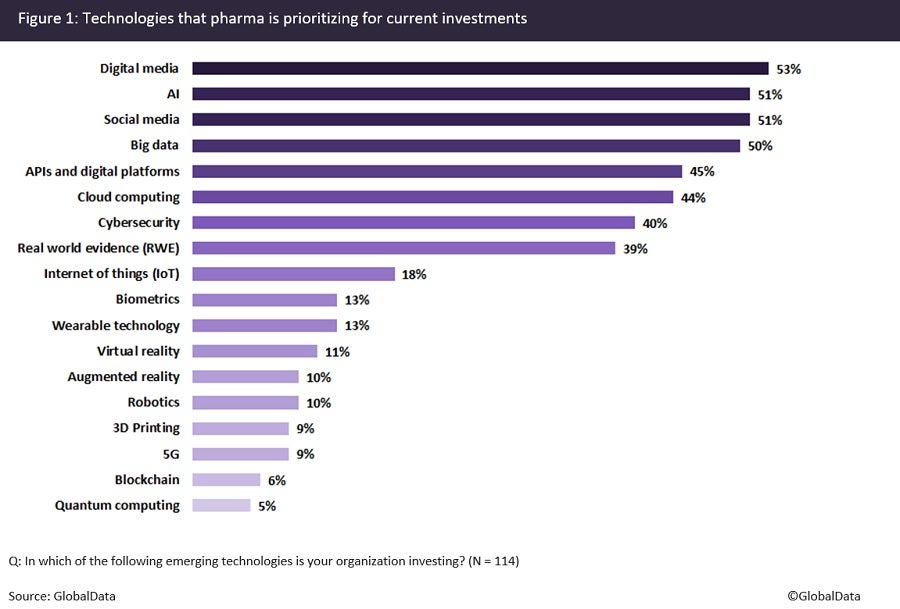AI will continue to attract investment in near future in the healthcare industry
Artificial intelligence (AI) was seen as one of the top current investment priorities and was thought to continue to attract investment in the healthcare sector in the upcoming two years, according to GlobalData’s latest report ‘Digital Transformation and Emerging Technology in the Healthcare Industry – 2022 Edition’.
In this survey-based report tracker, digital media was prioritised as a top current investment target, with 53% of surveyed respondents confirming that their companies are currently investing in this technology. It was followed by AI, social media and big data (Figure 1). Compared with last year’s data, digital media saw the biggest increase in current investment, up by 22% from last year. AI (+9% from 2021), social media (+8%) and big data (+5%) have also gained since last year, besides trending as very popular technologies for investment priorities for several years. Their combined usage can release synergetic power and potential that could be disruptive to the healthcare sector.
While digital media was selected as the number one current investment target, the percentage of companies investing in this technology is expected to drop by 16% over the next two years. This would likely be due to the current inflation and rising costs, which contribute to a gloomy investment environment. In the next two years, the surveyed healthcare industry professionals believed that their companies will prioritise AI as the main investment target (figure 2).

Having topped the chart as the most attractive investment target since 2018, AI is a rather versatile technology that can be applied in a wide spectrum of processes in the pharmaceutical value chain, making processes faster and more efficient; eventually saving time and labour costs.
The technology has a multititle of applications; for example, companies like Exscientia are using AI to help their pharmaceutical clients analyse vast data sets to identify potential drug targets in a shorter time. K Health, in its AI-based telehealth app, is using AI and big data to help users access accurate information on their symptoms and connect with physicians; BioSymetrics is using AI and machine learning to provide a platform and models to help pharmaceutical companies to identify targets for drug discovery; while Bayer’s AI-enabled Calantic™ Digital Solutions platform, which combines AI with Cloud computing, is used to provide more structured tasks and more improved workflow, to ease workload and pressure for radiologists.
The new digital era has been driving the uptake of digital technologies. Technologies like AI are expected to bring disruptive power to and revolutionise processes within the healthcare sector. There has been an increasing number of successful AI-use cases in the healthcare industry that support a growing trust in AI. AI’s potential is substantial – not only limited to shortening the time and reducing cost in the drug discovery process, or providing healthcare professionals with faster and more accurate diagnoses.
Related Companies
Euromed Pharma
No Byline Policy
Editorial Guidelines
Corrections Policy
Source




